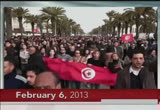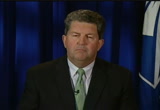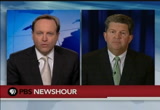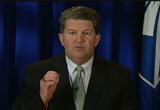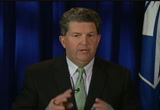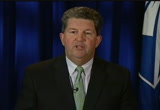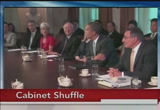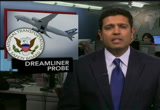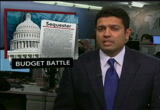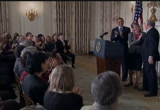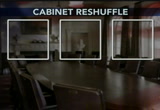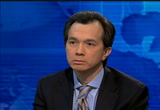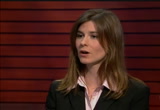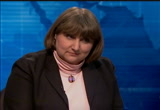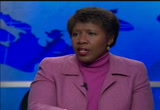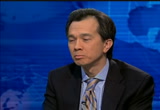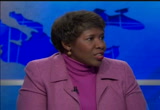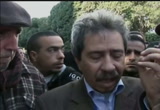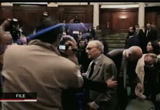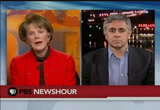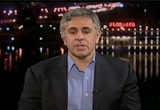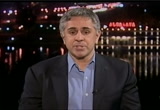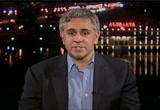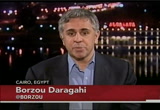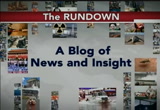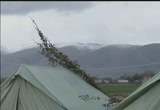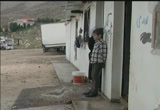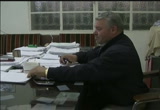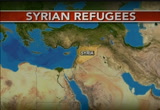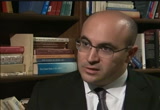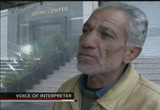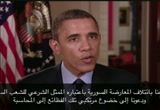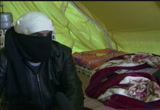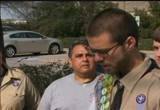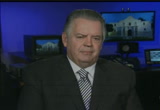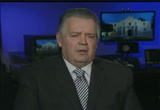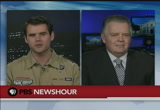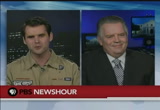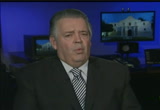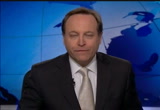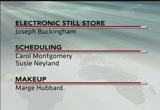tv Eyewitness News at 6 CBS February 6, 2013 6:00pm-7:00pm EST
6:00 pm
captioning sponsored by macneil/lehrer productions >> brown: "neither rain nor sleet nor snow." but the cash-strapped u.s. postal service will eliminate mail delivery on saturdays. good evening, i'm jeffrey brown. >> ifill: and i'm gwen ifill. on the "newshour" tonight, we talk with postmaster general patrick donahoe. >> brown: then, president obama picks r.e.i. executive sally jewell to run the interior department. we look at how the cabinet is shaping up with many posts yet to fill. >> ifill: we have two stories from the middle east. margaret warner gets the latest from tunisia, the birthplace of the arab spring, where a leading opposition figure was assassinated today. >> brown: and ray suarez reports
6:01 pm
on the plight of syrian refugees who've fled to lebanon. >> at this tent camp in al-marj, in the eastern part of lebanon's bekaa valley-- only 25 miles from the syrian border-- refugees are struggling to adapt to a new, impermanent reality. >> ifill: and we close with a look at what's happening with the boy scouts, as they struggle to decide whether to lift a long-standing ban on openly gay members. >> brown: that's all ahead on tonight's "newshour." >> major funding for the pbs newshour has been provided by: >> this program was made possible by the corporation for public broadcasting. and by contributions to your pbs station from viewers like you. thank you.
6:02 pm
>> brown: the u.s. postal service announced today it plans to end saturday mail delivery beginning in august. under the plan, post offices already open on saturdays will remain so. packages will also continue to be delivered on saturdays. but home and business mail would end. the move would save an estimated $2 billion annually. the postal service ended the last budget year with a record loss, nearly $16 billion. today's decision was criticized by several members of congress who may try to overule the agency. and the head of the letter carrier's union called the move "a disastrous idea that would have a profoundly negative effect." joining us now is postmaster general patrick donohoe. and welcome to you. you spoke today being in a "very scary position financially." how scary? >> well, here's where we are
6:03 pm
right flow. now. as you mentioned we had a pretty substantial loss last year and those were accounting losses. $11.1 billion of the $15.9 is attributed to prepayment for retiree health care that we didn't pay. we defaulted. you have to count that in terms of your accounting rules. so what happened last year, when all was said and done, we had a loss of about $2 billion are a little over $2 billion from an operating revenue perspective. the problem that you have going forward is each year that we've had these losses brings the cash levels down farther and further. at one point in october we had four days of cash on hand. that's entirely too small amounts of money for an organization our size or any size. >> brown: you wanted to do this stop the saturday delivery for a while and congress said
6:04 pm
no. this time you think you can go ahead. is this getting around congress? >> the way we interpret the continuing resolution ag as parf appropriation the postal service gets we have looked at this in a number of different ways. the money appropriated to us from congress is different than money appropriated to other agencies. we are, in fact, are refunded for services provided a year earlier. so as we've looked at this, we're like that's not so sure this applies. the key thing is this-- the postal service needs to make serious change. we need to address a number of issues-- six to five day of letter mail, $2 billion. reforming our health care. resolving long-term payments that we know we're responsible for and want to make as long as owning our over health care. that's worth $7 billion a year. we can not only shrink the gap from a standpoint of loss, but we can get back on good, firm financial footing and pay our
6:05 pm
debt down. now, there are people who will be critical-- "you shouldn't make these changes." but you cannot put your head in the sand and hope problems will go away. >> brown: i citedlet criticism from the president of the letter cariers. i just want to understand. he is saying this will be harmful specifically to small businesses, rural communities, the elderly, disabled, others who depend oned is delivery. are you denying there will be that kind of pain or are you just saying, yes, but we have no choice. >> we have no choice at this point, and we do not know the extent of impact that we'll see. we've done many surveys, according to every survey that we've done, that's been done outside the postal service. 70%-plus of americans consistently say the postal service, who takes no money now-- we get no tax money-- shouldn't get a tax bailout and should live within their means, meaning if twee need to eliminate delivery on saturday we do. now, our proposal is to
6:06 pm
eliminate delivery of mail but to continue to deliver packages, which includes medicine for the elderly and handicapped and the rural areas. and that's what our customers have told us. last year we made some changes. post offices. we talked about having to close small, nonprofitable postal offices. we spent a lot of time in the field and herd back from crust mers. they said we don't care if you shrink the opening, just keep the it open. here's the problem we're facing, jeff reerk no matter what anybody thinks on this-- people pay bills online. in the year 2003, we delivered 51 billion-- with a "b--" pieces of stamped mail out of the mailbox. this year it will be 21 billion. 30 billion pieces in less than 10 years at 46 cents apiece say differential in that group of $14 billion.
6:07 pm
nobody is stepping up saying i'll take a pay cut that makes those kinds of differences us. nobody is saying any other opportunities for us to make these changes. what we're trying to do is take a rational business approach on this, common sense, trim where we can, keep delivering the growth products like packages, but when we've lost that much mail, you cannot continue to deliver six days a week with that kind of loss. >> brown: let me just ask you briefly, if you would, because given the kind of changes you are talk pentagon, people paying online, for example. where is this headed? does the american public have to get used to a lesser service and perhaps at some point the end of the postal service? >> no, not at all. we think the future is very bright, as long as you take the steps to get the financein order. our plan-- our plan has us getting back in the black and paying the debt down. now, will there be changes? absolutely. some of the changes we discussed already. we have already made plenty of
6:08 pm
changes. since the year 2000, this organization, the postal service has reducedly the head count-- head count, payroll, not jobs or job descriptions, payroll-- by 305,000 employees, 193,000 since 2008. we have-- our people do a great job. they're very productive. we have done anything and everything in our power to try to catch up to the loss that we've got in volume. people say, suggest we raise prices dramatically. that chase more volume away. we are trying to take a very business-like approach. we think it's a win-win. everybody has a little skin in the game here and in the end you have a strong postal service that's delivering packages, direct mail, and commercial first class mail into the future. >> brown: postmaster general patrick donohoe, thank you very much. >> thank you, jeffrey. >> ifill: still to come on the "newshour": filling in the president's team; killing an opposition leader in tunisia; fleeing the violence in syria and delaying a decision on gay
6:09 pm
scouts. but first, with the other news of the day. here's hari sreenivasan. >> sreenivasan: a new round of fighting broke out today in damascus, syria-- the heaviest in weeks. rebel fighters made a thrust toward the central part of the capital, and smoke rose over the city as government forces fought back with artillery. they're trying to hold the core of the city, the main stronghold for president bashar al-assad. in northern mali, french ground troops battled islamist rebels overnight, outside the city of gao. it was new evidence that while the french have retaken key cities, the insurgents have not yet been routed from the countryside. meanwhile, french and malian soldiers found caches of industrial-strength explosives and makeshift bomb labs. the rebels had hidden them outside gao. u.s. investigators said today they are not ready to rule that lithium ion batteries used in boeing's 787 dreamliners are inherently unsafe for aviation. instead, the national transportation safety board said manufacturers need to build in better safeguards. at the same time, the board said investigators are still weeks away from determining what caused a battery fire on a japan
6:10 pm
airlines dreamliner in boston. in the meantime, all 50 of the planes in service, remain grounded. budget battle cries echoed up and down pennsylvania avenue in washington today. president obama called yesterday for a small package of tax hikes and spending cuts to avert the sequester, much larger cuts now set for march first. but house speaker john boehner said today the president has to accept major spending reductions just as republicans had to agree to raise the national debt ceiling. >> we got the debt limit out of the way so that we weren't jeopardizing the full faith and credit of the united states government. at some point, washington has to deal with its spending problem. i've watched them kick this can down the road for 22 years that i've been here. i've had enough of it. time to act. >> sreenivasan: at the white house, spokesman jay carney it's the republicans who are being irresponsible, by rejecting the president's appeal out of hand. >> he put forward a proposal for avoiding that outcome while
6:11 pm
congress continues working on longer term deficit reduction. that's the sensible thing to do. why make-- why punish the american people because you haven't been able to achieve your ideological objectives through other means? >> sreenivasan: in another development, the associated press reported the u.s. military is cutting back from two aircraft carriers to one, in the persian gulf. the report cited u.s. officials who said it's a direct response to the looming, across-the-board cuts. u.s. and british regulators have fined the royal bank of scotland more than $610 million for manipulating a key interest rate. the u.s. commodity futures trading commission said today that r.b.s. made hundreds of attempts to manipulate the rate known as libor. it's a global benchmark for rates on everything from home mortgages to credit card payments. two other banks-- barclays and u.b.s.-- have already been fined for their roles in the scandal. wall street mostly stayed where it was today. the dow jones industrial average gained seven points to close at 13,986. the nasdaq fell three points to close at 3,168.
6:12 pm
those are some of the day's major stories. now, back to gwen. >> ifill: president obama made his latest cabinet selection today, but the senior ranks of his administration are still depleted as his second term begins. >> sally has spent the majority of her career outside of washington-- where, i might, add the majority of our interior is located... ( laughter ) she is an expert on the energy and climate issues that are going to shape our future. >> ifill: sally jewell, c.e.o. of the outdoor recreation company, r.e.i., is president and so saying, president obama's pick for interior secretary, succeeding former colorado senator ken salazar. unlike other cabinet members, jewell comes to the job entirely without washington experience. with a background in business and as an oil industry engineer, and said she is humbled by the opportunity. >> i have a great job at r.e.i. today, but there's no role that compares, than the call to serve my country as secretary of the department of interior.
6:13 pm
>> ifill: jewell is only the fourth public announced nominee to fill seven second-term to fill 11 second-term cabinet vacancies. the major departures so far: treasury secretary timothy geithner, defense secretary leon panetta and secretary of state hillary clinton. only clinton's replacement john kerry has won senate confirmation and taken up his new post. the national security moves one step closer to completion with tomorrow's hearing for c.i.a. nominee john brennan. the president's environmental and energy team will be completely reformed. in addition to salazar's exit at interior, lisa jackson is leaving as environmental protection agency chief as is energy secretary steven chu with no replacements announced yet. and mr. obama's economic team will also have new faces, as he moves to replace: labor secretary hilda solis, trade representative ron kirk and rebecca blank, the interim
6:14 pm
commerce secretary who replaced gary locke when he became ambassador to china. critical issues await them, from action on climate change, to the keystone x-l oil pipeline, to negotiations on new trade agreements with a dozen nations, and the european union. the president set the tone for the selections to come, with his description of jewell today. >> she knows the link between conservation and good jobs. she knows that there's no contradiction between being good stewards of the land and our economic progress, that in fact, those two things need to go hand-in-hand. >> ifill: the immediate response to jewell's nomination was positive -- from business and environmental groups alike. we get more now on the president's second-term cabinet and the issues they will face from coral davenport, energy and environment correspondent for "national journal." greg ip, u.s. economics editor for the economist and julie rovner, health policy correspondent for national public radio. you each cover different parts of this administration, different parts of the government, starting with you
6:15 pm
and with the selection today of sally jewell, carl, what are the big issues which await the new nominee or new secretary? >> so the secretary of interior is a really important position in terms of the administration's energy plan going forward. the interior department is in charge of the nation's public lands, and also offshore. so whatever happens going forward on energy development on public land, on oil and gas developments, on offshore oil development oconservation, and something that this administration has started was the first administration to do renewable energy development on public lands. the interior secretary is going to oversee all of that, and it's going to be a big piece of the vile agenda but also the economic agenda in terms of how energy development is going to be a part of the economy going forward. >> ifill: let's talk about the economic agenda. what await there. >> it will be pretty much all
6:16 pm
budget, all fiscal all year. presidents choose treasury secretaries and the economic team to suit the circumstances of the time. timothy geithner was the pick four years ago in part because he was so well suited to deal with the financial crisis. now obama goes with a guy whose background is heavily steeped in negotiating with the hill. he has the confidence of the president. he knows his way in and out of these issues. he shares the president's philosophical preferences -- protect the social safety net, deal with the deficit, but not sacrificing the safety nest net. the big challenge for mr. obama and mr. lu is getting something done will require coming to agreement with congress, and there the philosophical divide is so wide, that makes getting something done very challenging. >> ifill: part of the divide is health care. this is the time when the rubber hits the road in terms of implementation. this is a cabinet member who is not leaving. >> i think one of the reasons she has job stability and we see
6:17 pm
with some of the the appointments getting confirmed. there has not been a head of the-- one of the subcabinet appointments in him h.s., the head of the center for medicare and medicaid services since 2006, in the middle of bush's bs second term because it is so difficult to get that through the senate. it would be hard to imagine trying to replace kathleen sebieluous, which is probably a good thing, because she has so much to do this year, getting the affordable care act up and running, most of it in times for january 1, 2014, plus all of these budget debates that are going on that will inevitably have to do with medicare and medicaid. she's going to have a very busy year. >> let me ask another key question, does the cabinet matter? we talk about the closeness the president has with kathleen sebieluous. and there were three hugs
6:18 pm
between ken salazar and the president as he announced. does it matter that you have this closeness? is anything getting done in the departments or does it all get done at the white house. >> the decisions are made at the white house and they get told to the departments but there is still an enormous amount the cabinet members do. remember, they're running huge, huge, bureaucracies if you will, for better or worse. just h.h.s., the f.d.a. is under h.h.s., these are agencies in charge of billions and billions and billions of dollars so i think these cabinet members do have a lot of responsibility, even if the most important political decisions are being made at the white house. >> ifill: and the most important political economic decisions being made out of white house? >> they're certainly at the white house, but you do have situations and you had them in the past where the treasury department was very much a junior partner in that process,
6:19 pm
when the big decisions were made at the white house. that was the case for the first two treasury sctz under george bush. that has not been the case with president obama. don't forget where jack lu is coming from, the outgoing chief of staff of barack obama. he has been central to all the thinking on the process. so to your question, does the cabinet appointment matter? it does in a sense, when congress or another country is negotiating with the administration. they want ton the person across the table from them speaks for the president. >> ifill: which is also the caiz for u.s. trade representative who is also leaving and has to be replaced. >> that's right. >> ifill: coral, i'm curious about what happened today in the dining room at the white house with this appointment. the president talked about climate change at the inauguration speech, surprising people, but it's not just the interior department, it's not just federal lands. it's also e.p.a., it's also energy. >> when it comes to climate change the number one department to watch, the department that's
6:20 pm
going to be at the center of the whole story is the e.p.a. i think it's clear that in his second term, the president is not going to have cooperation from congress on his climate change agenda. we tried to do that in the first term. he tried to do it when he had democrats in both the shows and senate. he still couldn't get that bill through. he's made it clear that he's going to flex his executive muscle, his executive authority, and use the cabinet agencies to move through everything he can on climate change, and so he's got a big rule that he-- sort of a big lever that he can pull in the e.p.a. we'll probably see the first steps on it coming later this year, a major role that would require coal-fired power plant to cut their greenhouse gas pollution, existing coal-fired power plant. this will be a huge economic role. it will have huge environmental impact and it will be very politically controversial. the emed p.a. is going to be at the center of the climate change
6:21 pm
firestorm in this term. >> ifill: does it matter if it's a cabinet member can get along with congress? >> i think it really does. in this case, congress probably won't be acting on a climate change bill but they will be-- if they don't like what the e.p.a. is doing, you can guarantee that the republican majority congress is going to do everything they can to push back on that rule. they're going to try to gut it. they're going to try to block it. they're going to try to strip the e.p.a.'s authority to do everything it can on climate change. if you have a secretary or e.p.a. chief, agency chief, who can get along can congress, can make a case for the bill, that can smooth the way. that can keep it from blowing up as much as it might. >> ifill: greg, the big issue is climate change and health care implementation. we know the big issue is the budget. how do you get all of that done? why would any cabinet member
6:22 pm
want that job? >> when the president calls and asks you to serve, it's very hard to say no to that. it's a big challenge. a lot of these people want a challenge. you're absolutely right, this is a very, very tough second term. you have huge issues and again you're in a situation where it's not enough for the president to have people that he trusts around around him. he's gog to have people on the other side where you can actually close the distance and get deals done, not just with congress but on the international with trading partners. the president would love to have a free trade deal with europe but you're talking about incredibly complex sensitivities, not just with those countries but with domestic constituencies, with members of congress who may have particular sensitivities on this product or that product. descrg the best of intentions is not always enough. descrg the b]ót of intentions is that one of the president's chief health care adviser is leaving. >> she was a deputy chief of staff. she was one of the people who
6:23 pm
put together this entire law, and so to have someone of that sort of depth of know and experience in the white house just outside the oval office with the president's ear is important. i know cecilia munoz has this as part of her portfolio. but i think she's going to be awfully busy with immigration this year. it's going to be really that much more important. it may leave that much more running room for the secretary sebieluous to go forward. >> ifill: and the first thing that has to be implemented, the first thing on the plate? >> everything is coming down to next january 1. these are the exchanges and medicaid expansion. secretary sebieleias has been meeting with governors and talking to people. she has an awful lot to do. the department has an awful lot to do. and obviously what cels going on with the budget tesame time. >time. >> ifill: julie rovner greg ip coral davenport, thank you all for fill us in.
6:24 pm
>> brown: now to today's killing of a political leader in tunisia-- the birthplace of the arab spring. margaret warner reports. >> warner: protesters poured into the streets of tunisia's capital tunis and other cities, in a fury over the assassination of chokri belaid. he'd been a leader of the opposition to the islamist-led coalition government. belaid was gunned down this morning as he left his house in tunis, and taken to a nearby medical clinic where he was declared dead. within hours, thousands of people massed near the interior ministry and elsewhere with police firing tear gas, as the protesters fought back with stones. belaid's brother joined in charging the ruling ennahda party was either behind the killing or did nothing to prevent it. >> ( translated ): the message is: you shut up or we kill you. the ennahda party wants to rule
6:25 pm
the country on its own. actually, he has been receiving threats of murder for a long time. >> warner: officials of ennahda denied any role, and in france, tunisia's moderate islamist president moncef marsouki condemned the belaid killing. >> ( translated ): this assassination took place today itself, with the knowledge that i was to speak to you. this is a threat, it is a letter that has been sent but which will not be received. we refuse this letter, we refuse this message and we will continue to unmask the enemies of the revolution and to continue our policies. >> warner: in late 2010, tunisia saw the first mass protests of the arab spring, and in january 2011 became the first to oust its longtime dictator. the islamist party ennahda won parliamentary elections that october, but fell short of a majority and vowed to be inclusive in governing. but there've been growing tensions since then, including violent protests at the u.s. embassy in tunis last
6:26 pm
september. ultra-conservative salafi muslims, who are advocating a more islamic identity for tunisia, have been blamed for that attack, and others. the salafi influence has, in turn, alarmed the opposition. after today's assassination, belaid's popular front party and its allies announced they will pull out of a constitutional assembly responsible for writing a new governing charter. tunisia's prime minister then announced he's forming an interim government of technocrats, leading to new elections. for more on the assassination and the political situation in tunisia, i'm joined now by borzou deragahi, middle east and north africa correspondent for "the financial times." welcome back. first of all, tell us about chokri belaid, a little more about him. who was he and what was this popular front that he led? >> he was a very vocal leftist politician, part of a coalition called the popular front that
6:27 pm
included communists and other leftists. he was a very active against the dictatorship of ben ali, which was overthrown two years ago, which replaced by the current government eventually, which is dominated by islamists, and he's been very active against this government as well. he's very vocal, always on tv and the radio, and very militant in favor of labor rights and other core leftist issues. >> warner: now, his brother was heard today-- we just ran the clip of him-- blaming the enada government or factions in it. the interior minister was blaming the religious zealots. help us sort through this. >> it sort of points to the poisonous atmosphere right now within tunisia's political scene. you have a secular liberal
6:28 pm
leftist opposition accusing the islamist-dominated government of giving free reign of various, more extreme islamist groups suctocommit various acts and vandalism and escalating violence. you have a situation where this gentleman, mr. belaid, was killed just hours after he appeared on television, accusing the government of being behind the violence. so it's a very, very tense situation, not only did his brother get on the air and blame the party for the killing, but his wife, his widow, hours after the killing took to the streets in a demonstration and explicitly blamed the government as well.
6:29 pm
it was very volatile situation. >> warner: has the government been playing a double game-- thagame orare they trying to sta course between them? >> i think the accusation is that the government has been playing footy with some of the more extremist elements within the islamist camp, sort of giving them a wink and a nod to say that, hey, we're on your side. while on the other hand condemning their violent acts. if you talk to the leaders, they will never say that they support the more extremist groups. but there is this accusation. and there is this sense that lawlessness has increased in tunisia under the government, and the targets of the violence have been the symbols of the
6:30 pm
secular elite and secular opposition such as art galleries and hotels that serve alcohol and universities and so on. and so the worry is, the concern is that they're allowing the extremists, the more militant ones, to serve as sort of their shock troops, making changes on the ground, that they're unable to make vocally and publicly. >> warner: tunisia was the most western-oriented, outward looking of all these countries caught up in the arab spring. what does this say, this incident say or portend about the very stability of tunisia's transition now? >> it's a very, very tough situation right now. and it's a very important one. tunisia is often held up by the international community, by donors and international advocates of the arab spring revolution as a sort of poster child, as a model for other
6:31 pm
countries such as egypt or libya or even yemen and syria, as a potential model for them to follow. and so, you know, what has happened here is that there's been a major rupture, a major, unprecedent event. you had one secular politician killed last year in a riot in a sort of melee in the south of the country. but this was a targeted, very professional assassination in the heart of the capital. something like this just doesn't happen in tunisia. and it has precipitated a major crise for tunisia and its international backers. >> warner: borzou deragahi of the "financial times" thank you very much. >> it's been a pleasure. >> ifill: next, we return to the conflict in syria and the unfolding refugee crisis there. the "newshour" recently sent freelance video journalist paige
6:32 pm
kollock to neighboring lebanon to see how the newly displaced are dealing with winter, inadequate supplies and discrimination. ray suarez narrates our story. ( explosions ) >> reporter: 22 months in and showing no signs of abating the fight for the future of syria drags on. ( explosions ) both sides continue to wage all- out war with more than 60,000 dead and the plight of syria's displaced and dispossessed only grows worse. at this tent camp in al-marj, in the eastern part of lebanon's bekaa valley, only 25 miles from the syrian border, refugees are struggling to adapt to a new, impermanent reality and to winter temperatures that routinely drop below freezing. >> ( translated ): if you want me to compare between living here and living in syria, we're not living here. >> reporter: this man, who calls himself abu mohammed, arrived in
6:33 pm
december. he didn't want to reveal his face, still deathly afraid of syrian president bashar al assad. >> ( translated ): i came here because bashar al assad was killing us, was killing our women and raping them. they were kidnapping the women and raping them inside their tanks. they destroyed our houses, shops and cars. they didn't leave anything. >> reporter: as harsh as that was, he and others, like maryam al-okla, say life here is also unbearable. >> ( translated ): no one is helping us. look at the water, it flooded yesterday, and my kids, i took them outside since the morning because i don't have diesel to heat the room. what should i say, what should i say, we were dying over there and we're dying here. >> reporter: with her three children, al-okla lives up the road in this modest apartment in majdal anjar, where she pays $100 a month in rent. her daughter-- asked whether she prefers her new life to her old one-- says the broken heater, called a sobia, makes the choice clear.
6:34 pm
>> ( translated ): there. here the house is small and doesn't fit us. we can't sleep. we are sleeping next to the sobia, but we're turning the sobia off at night. we try to turn it on but it's not working. >> reporter: each day more refugees stream into the area, lining up to register with dar al-fatwa, the organization responsible for sunni affairs in lebanon. the country's muslim population is fairly evenly divided between sunni and shiites, but the vast majority of syria's refugees are sunni. and here they hope to receive deisel fuel for their stoves and blankets to keep warm. the local population is buckling under the strain, says sheik amayn sharkieh, head of humanitarian affairs for dar al- fatwa. >> ( translated ): we opened our houses, our families, and we put the people in our houses until
6:35 pm
the amount of refugees increased so much that it became a burden on us. >> this crisis is very complex, because it covers quite a wide area. it covers at least four neighboring countries, five neighboring countries. and it's growing. >> reporter: alexandra brosnan is with the international rescue committee, a non-governmental relief agency working to aid syria's displaced. >> if we think back to april, there were 33,000 registered refugees. today, were looking at over 700,000. it has evolved very, very quickly. and it's also difficult in that we do believe it's going to be protracted already. >> reporter: last week alone, some under cover of night, more than 20,000 fled into northern jordan, overwhelming an already crowded refugee camp. according to the united nations, jordan's now home to more than 238,000 syrian refugees. to syria's north, some 170,000 have migrated into turkey. there are tens of thousands
6:36 pm
living in iraq and egypt, too. but lebanon-- the smallest country in both size and population-- is home to the greatest number of displaced syrians, more than 250,000. >> if you look at the ratios of population to refugee population, lebanon is arguably the one that is under the most pressure. >> reporter: aram nerguizian is a visiting fellow at the center for strategic and international studies in washington. >> you have what was a trickle become potentially an open spigot. you have anywhere between 200,000 and 300,000 syrians who are essentially living with lebanese families wherever they can, in some cases squatting. you have to remember that you already have 200,000 to 400,000 palestinian refugees. you have to remember that this is a country of four million to 4.5 million people and with very small territory, very rugged. >> reporter: unlike in turkey
6:37 pm
and jordan, thus far the lebanese government has refused to build permanent camps for its syrian population. neguizian says that's based on its experience with palestinian refugees, who for decades have lived in camps in lebanon, some of which became autonomous and ungovernable states in the 1970s. >> here you are-- 2013. you still have that same palestinian issue. you add to that an additional 200,000 to 300,000 syrian refugees. again, predominantly sunni. it's essentially creating a lot of the same, you know, backlash. >> reporter: this lebanese drivers, who didn't want to give their name, confirms that hostility. >> ( translated ): the lebanese people are maxed out more than the syrians now. the lebanese people are living in their country which is only 4,500 square miles, i don't mind, anyone that got persecuted over there and came here to stay
6:38 pm
safe, i don't mind, but for them to interfere with my interests, i'm not going to accept that. >> ( translated ): the refugees here are suffering a lot, and the lebanese people are harassing them a lot, frankly. in the past, to rent a house the standard was about $200. today, since we have refugees, they are taking $800 to $900. the landlords are using the people. >> reporter: in addition to struggling to house and care for the refugee population, there's growing concern that the ongoing conflict and the wave of refugees could upset a delicate balance in lebanon-- a country comprising sunni and shia muslims, maronite and greek orthodox christians, druze and others. >> you have sunni fighters from the predominantly sunni north of lebanon who are now fighting with the armed opposition. and you have shiites, especially from hezbollah, who are fighting on the side of the assad regime. they basically both go to to syria, they duke it out and they come home. and they don't bring the fight back.
6:39 pm
the problem is that that works until it doesn't. >> reporter: last october, a bombing in beirut killed intelligence chief wissam al hassan, a sunni. many believe assad and pro-assad forces within lebanon were behind the attack. to avoid reigniting a civil war in lebanon along sectarian lines, neguizian says the international community must provide support to help lebanon deal with the refugees. >> lebanon is the smallest player in the levant, least capability, the biggest pressures, and at the best of times, that was precarious, and this is not the best of times. >> we're under no illusion. the days ahead will continue to be very difficult. >> reporter: to that end, last week in a video directed at the syrian people, president obama announced $155 million more in humanitarian aid for those displaced by the fighting. >> this new aid will mean more warm clothing for children and medicine for the elderly. flour and wheat for your families and blankets, boots and
6:40 pm
stoves for those huddled in damaged buildings. >> reporter: that assistance came ahead of a donor's meeting in kuwait, where countries from around the world pledged $1.5% billion, nearly two thirds of that to deal with regional issues arising from the crisis. >> i do believe that they will follow up, and i do believe that this was a successful way to bring much needed resources to the crisis. but we do need to make sure that we continue to do that in a coordinated and fast fashion. >> reporter: until that money materializes and resources can be marshalled, many in the bekaa valley, like abu mohammed, will be left with little hope and mounting frustration. >> ( translated ): where is islam? where is america for the syrian people? where is the world? they all say we are with the syrian revolution, but we haven't seen anything. these are empty words. >> reporter: there's no telling
6:41 pm
how long promises by the world will be just "empty words" as the conflict rages on in his homeland. however, there will more and more refugees like him in lebanon and other neighboring countries this winter-- cold, tired, hungry and war weary. >> ifill: you can find more about syria's refugees and internally displaced on our website. we have a dispatch from a camp in northern syria where two toddlers have died this winter of hypothermia. you can also find out more about what the u.s. is doing to help, including the use of underground networks to deliver x-ray machines and other equipment. >> brown: finally tonight, the boy scouts' decision to delay a vote on gay membership, after strong reaction on both sides to a possible move to lift the organization's ban. >> wherever you find community projects, you'll generally find one or more boy scouts.
6:42 pm
>> brown: for generations, scouting has shaped itself as an organization devoted to national ideals and values. but in recent years, the scouts have come under criticism that they are fundamentally at odds with one of those values: the growing acceptance of gays. hundreds of eagle scouts-- recipients of scouting's highest honor-- have returned their badges to protest a long-standing ban on openly gay scouts and leaders. will oliver is a gay eagle scout in massachusetts. >> i was taught that there were three kinds of duties. first, duties to god and country, and second, duties to other people. i was taught about a third kind of duty as well. the duties that i owe just to myself, to speak the truth, not to shirk my sense of right and wrong, not to stand by passively in the face of injustice. >> brown: in 2000, the u.s. supreme court upheld the ban, but the pressure has continued to build. some major corporate funders,
6:43 pm
including u.p.s. and merck, have withdrawn their support. and two board members of the boy scouts of america have vowed to make the organization more inclusive. last week, the scouts signaled they were considering a reversal, possibly allowing religious and civic groups that sponsor local chapters to decide for themselves whether to allow gay scouts and scout leaders. president obama weighed in, opposing the ban, in an interview with cbs news. >> gays and lesbians should have access and opportunity the same way everybody else does, in every institution and walk of life. >> brown: and on monday, scouts and their families delivered petitions bearing more than a million signatures calling for an end to the ban to the b.s.a.'s national headquarters in irving, texas. but some churches and others warned that if the ban is abolished, they will drop their sponsorship of scout chapters. and republican governor rick perry of texas, an eagle scout himself, argued that lifting the
6:44 pm
ban would go too far. >> scouting is about teaching a substantial amount of life lessons. sexuality is not one of them. it never has been, it doesn't need to be. you know, i think most people see absolutely no reason to change their position. and neither do i. >> brown: today, the "boy scouts of america" board decided to delay any decision. they issued a statement saying, "due to the complexity of this issue, the organization needs time for a more deliberate review of its membership policy." now, it will fall to the 1,400 voting members of the boy scouts national council to decide on a membership standards resolution in may. two views now: zach wahls is an eagle scout and founder of the group, scouts for equality, which is pushing to change the policy. richard land is president of the southern baptist convention's ethics and religious liberty commission.
6:45 pm
first to you, zach wahls, what's your reaction to today's move to delay a decision on ending the ban? >> absolutely. you know, it was a little disappointing, to be sure. a lochts us were expecting the b.s.a. to lift of ban but it makes sense to take this to their national council and i will discuss it a little further. >> brown: richard land, what's your reaction to today's move? >> well, i-- i'm very much pleased that they-- that they postponed this and are going to let the grass-roots council from all across the nation decide this. i have no doubt which way they will decide. they are responding to an enormous grass-roots uprising that has taken place since thi announced this proposed policy change. >> brown: and staying with you, the argument now for keeping the ban. what is the argument? >> the argument is simply that the boy scouts have the right to
6:46 pm
have their core principles and to decide their membership policies and as recently as six months ago after a two and a half year study by the boy scouts themselves they said that the current policy was supported by an overwhelming majority of the parents of the youth that they serve. and this is-- this attempt at compromise that has been proposed pleases no one. it doesn't please those who want homosexual scout membership, and it doesn't please those who don't. and it takes away the leading legal-- the legal guardianship they have. because the supreme court has said in 2000, that the reason they are able to maintain this membership ban is because it's part of the core principles of scouting. if you give a local option, that's not a core principle. that's a-- that's a preference. and the constitution does not protect preferences. >> brown: zach wahls, go
6:47 pm
ahead. first on the broad argument. >> yeah, absolutely. yeah, well, today, quinnipiac university released a poll that found more than 55% of americans support lifting the ban and only 33% support keeping the ban in place. that's a massive shift over the last two years. even though, richard, you're absolutely right, the scouting's study found some parents were certainly opposed to the policy a lot has changed since them. further you'll see young people overwhelmingly, people under the age of 44, more than 60% of us support lifting the ban. the question we have to ask ourselves is do we want boys to be raised by an organization still using values from the last century or do you want an organization that reflecting value of america that these yungz jung boys are going to grow up to lead. people like richard are trying to force people out of the program. we certainly aren't. it's people like richard who say scouting's values aren't for everybody, and we disagree. >> brown: mr. land, respond to that and also the scouts we saw in the setup piece, the ones who returned their badges who said
6:48 pm
we served honorably, and we want to be scouts. >> well, the boy scout have an over 100-year tradition of their core principles. they have the right to maintain them. the majority of people who are actually involved in scouting still support those principles. if there are people who want to have a program like the scout program that has different principles, this is a free country. they're perfectly free to have it, not try to impose their values on the boy scouts who don't want their values gloin zach wahls-- >> it's interesting, richard, do you know the scout law or the scout oath? i just find it hard to believe that you really care so deeply about the boy scouts when you don't even know what the core principles of the organization are. and the reason people like you are making this case is because for you this isn't about the boy scouts. for people like you this is about the problems you have with parents like mine. >> you know, zach, you have a really annoying habit of trying
6:49 pm
to say what other people are thinking when they don't think that. i am speaking for the tens of thousands of southern baptists who are boy scouts and participating in scouting. 70% of the boy scout organizations are supported by faict-based organizations, and 1.1 million scouts-- >> absolutely, absolutely. >> are in organizations that are sponsored by mormons and byicals and by baptistes, and i can assure you, they don't share your values. >> well, luckily nobody is trying-- >> brown: is sciewdz me, zach wahls, pnd to that about the sponsorship. it is 70% affiliate affiliated h religious groups. >> it absolutely is. >> brown: and the funding pressures coming from corporate sponsorships as well. >> you're absolutely right, richard. nobody is denying that 70% of the units are sponsored by
6:50 pm
religious organizations. episcopalian information, e.l.c.a. folks and united church of criet have issued statements saying lifting the ban would be more consistent with the b.s.a.'s fundamental values of dignitiy and respect which whichis why nobody is trying to removal catholics or mormons. you are the only people trying to remove poom from the program, sir. as far as the pressure put on the b.s.a., it makes sense that the corporate members who are also board members of the b.s.a. who oppose the ban would also be voting with their dollars. >> brown: richard land, let me ask you about the various sponsorship the pressure put on the boy scouts. how much of a role do you think that is playing in this debate right now? >> well, from what i've been told by people within scouting, it played a significant role in this proposed membership change, and they were trying to placate everyone, and they are pleasing
6:51 pm
no one. no one is happy with this compromise. zach's not happy with this compromise. he acknowledges he's not happy with the compromise. he doesn't want to allow any scout troops to what he calls discriminate against homosexual members. he wants to impose his views on the entirety of scouting. he said so just the other day on television when he was on television with me. >> in the situation room-- yeah, richard, we were on the situation room last night. we had the conversation then and i'm glad we've had a chance to hash this out. it has been a good talk. i will try and make sure you understand we aren't trying to remove anybody from the program. you're the only one trying to impose a ban, remove people from the program-- >> brown: excuse me. >> the mom from ohio-- >> brown: gentlemen-- >> people like a mom from ohio, who wanted to just abe part of her son's life. >> brown: let me ask richard land, if the ban is lifted, would your church, for example, urge members not join? is there a potential here for a split, a divided, or even two
6:52 pm
scouting organizations in the future? >> i don't think there's any question that if the-- if the ban were to be lifted, and they were to go to the local option, that there would be hundreds of thousands of scouts that are sponsored by organizations like the mormon church, like roman catholics and like baptists and other conservative faith organizations that would withdraw their sponsorship and go to other programs that would be parallel to the boy scouts. >> brown: and zach wahls, what do you think would happen if the ban is not lifted? >> well, i think if the ban isn't lifted this organization which i hold in the highest esteem willicism he no longer be relevant to a generation that has, unlike #-r richard, has embraced l.g.b.t. equality across the country. over 60% of people under 45 support inclusive scouting.
6:53 pm
i wish they would join us but if they don't they can leave the program. >> and you're welcome to start your own program, zach, if you don't like what the majority of boy scouts want to do. >> brown: richard land, zach wahls thank you very much. >> thank you very much, have a good one. >> ... spoke to several eagle scouts who were torn between their loyalty to an organization which their belief in equal treatment. you can listen to their stories online. >> ifill: again, the other major developments of the day: the u.s. postal service announced plans to eliminate saturday mail delivery, starting in august. packages will continue to be delivered. president obama nominated sally jewell-- head of the outdoor recreation firm r.e.i.-- to be secretary of the interior. and mass protests erupted across tunisia after a prominent opposition leader was gunned down. it was the first assassination there since the 2010 revolution that started the arab spring.
6:54 pm
>> ifill: online, we have the story of a renowned dancer taking a final bow. hari sreenivasan tells us more. >> sreenivasan: for more than 30 years, renee robinson has been a part of alvin ailey's dance company, longer than any other female performer in that troupe. we caught up with her during a run of farewell performances at the kennedy center. find that on art beat. plus, money manager jon shayne chimes in on making sense about what benefits his line of work offers investors. all that and more is on our website newshour.pbs.org. jeff? >> brown: and that's the "newshour" for tonight. on thursday, we'll look at the senate confirmation hearings for john brennan, president obama's choice to head the c.i.a. i'm jeffrey brown. >> ifill: and i'm gwen ifill. we'll see you online and again here tomorrow evening. thank you and good night. >> major funding for the pbs newshour has been provided by: ♪ ♪
6:55 pm
moving our economy for 160 years. bnsf, the engine that connects us. >> support also comes from carnegie corporation of new york, a foundation created to do what andrew carnegie called "real and permanent good." celebrating 100 years of philanthropy at carnegie.org. >> and with the ongoing support of these institutions and foundations. and... >> this program was made possible by the corporation for public broadcasting. and by contributions to your pbs station from viewers like you. thank you. captioning sponsored by macneil/lehrer productions captioned by media access group at wgbh access.wgbh.org
175 Views
IN COLLECTIONS
WJZ (CBS) Television Archive
Television Archive  Television Archive News Search Service
Television Archive News Search Service 
Uploaded by TV Archive on

 Live Music Archive
Live Music Archive Librivox Free Audio
Librivox Free Audio Metropolitan Museum
Metropolitan Museum Cleveland Museum of Art
Cleveland Museum of Art Internet Arcade
Internet Arcade Console Living Room
Console Living Room Books to Borrow
Books to Borrow Open Library
Open Library TV News
TV News Understanding 9/11
Understanding 9/11
